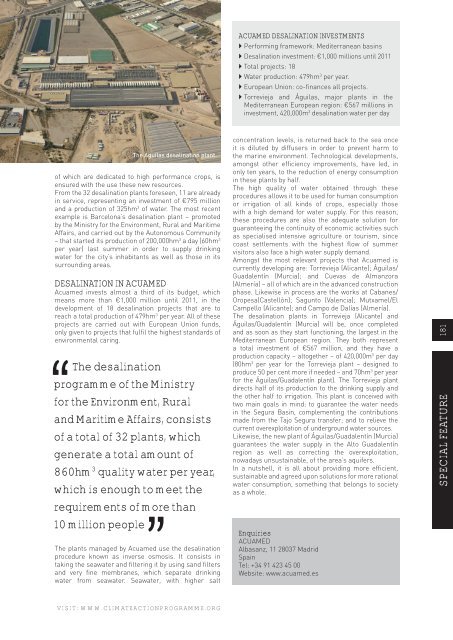Climate Action 2009-2010
You also want an ePaper? Increase the reach of your titles
YUMPU automatically turns print PDFs into web optimized ePapers that Google loves.
ACUAMED DESALINATION INVESTMENTS<br />
} Performing framework: Mediterranean basins<br />
} Desalination investment: €1,000 millions until 2011<br />
} Total projects: 18<br />
} Water production: 479hm 3 per year.<br />
} European Union: co-finances all projects.<br />
} Torrevieja and Águilas, major plants in the<br />
Mediterranean European region: €567 millions in<br />
investment, 420,000m 3 desalination water per day<br />
The Águilas desalination plant.<br />
of which are dedicated to high performance crops, is<br />
ensured with the use these new resources.<br />
From the 32 desalination plants foreseen, 11 are already<br />
in service, representing an investment of €795 million<br />
and a production of 325hm 3 of water. The most recent<br />
example is Barcelona’s desalination plant – promoted<br />
by the Ministry for the Environment, Rural and Maritime<br />
Affairs, and carried out by the Autonomous Community<br />
– that started its production of 200,000hm 3 a day (60hm 3<br />
per year) last summer in order to supply drinking<br />
water for the city’s inhabitants as well as those in its<br />
surrounding areas.<br />
DESALINATION IN ACUAMED<br />
Acuamed invests almost a third of its budget, which<br />
means more than €1,000 million until 2011, in the<br />
development of 18 desalination projects that are to<br />
reach a total production of 479hm 3 per year. All of these<br />
projects are carried out with European Union funds,<br />
only given to projects that fulfil the highest standards of<br />
environmental caring.<br />
“<br />
The desalination<br />
programme of the Ministry<br />
for the Environment, Rural<br />
and Maritime Affairs, consists<br />
of a total of 32 plants, which<br />
generate a total amount of<br />
860hm 3 quality water per year,<br />
which is enough to meet the<br />
requirements of more than<br />
10 million people<br />
“<br />
The plants managed by Acuamed use the desalination<br />
procedure known as inverse osmosis. It consists in<br />
taking the seawater and filtering it by using sand filters<br />
and very fine membranes, which separate drinking<br />
water from seawater. Seawater, with higher salt<br />
concentration levels, is returned back to the sea once<br />
it is diluted by diffusers in order to prevent harm to<br />
the marine environment. Technological developments,<br />
amongst other efficiency improvements, have led, in<br />
only ten years, to the reduction of energy consumption<br />
in these plants by half.<br />
The high quality of water obtained through these<br />
procedures allows it to be used for human consumption<br />
or irrigation of all kinds of crops, especially those<br />
with a high demand for water supply. For this reason,<br />
these procedures are also the adequate solution for<br />
guaranteeing the continuity of economic activities such<br />
as specialised intensive agriculture or tourism, since<br />
coast settlements with the highest flow of summer<br />
visitors also face a high water supply demand.<br />
Amongst the most relevant projects that Acuamed is<br />
currently developing are: Torrevieja (Alicante); Águilas/<br />
Guadalentín (Murcia); and Cuevas de Almanzora<br />
(Almería) – all of which are in the advanced construction<br />
phase. Likewise in process are the works at Cabanes/<br />
Oropesa(Castellón); Sagunto (Valencia); Mutxamel/El<br />
Campello (Alicante); and Campo de Dalías (Almería).<br />
The desalination plants in Torrevieja (Alicante) and<br />
Águilas/Guadalentín (Murcia) will be, once completed<br />
and as soon as they start functioning, the largest in the<br />
Mediterranean European region. They both represent<br />
a total investment of €567 million, and they have a<br />
production capacity – altogether – of 420,000m 3 per day<br />
(80hm 3 per year for the Torrevieja plant – designed to<br />
produce 50 per cent more if needed – and 70hm 3 per year<br />
for the Águilas/Guadalentín plant). The Torrevieja plant<br />
directs half of its production to the drinking supply and<br />
the other half to irrigation. This plant is conceived with<br />
two main goals in mind: to guarantee the water needs<br />
in the Segura Basin, complementing the contributions<br />
made from the Tajo Segura transfer; and to relieve the<br />
current overexploitation of underground water sources.<br />
Likewise, the new plant of Águilas/Guadalentín (Murcia)<br />
guarantees the water supply in the Alto Guadalentín<br />
region as well as correcting the overexploitation,<br />
nowadays unsustainable, of the area’s aquifers.<br />
In a nutshell, it is all about providing more efficient,<br />
sustainable and agreed upon solutions for more rational<br />
water consumption, something that belongs to society<br />
as a whole.<br />
Enquiries<br />
ACUAMED<br />
Albasanz, 11 28037 Madrid<br />
Spain<br />
Tel: +34 91 423 45 00<br />
Website: www.acuamed.es<br />
SPECIAL FEATURE 181<br />
VISIT: WWW.CLIMATEACTIONPROGRAMME.ORG












